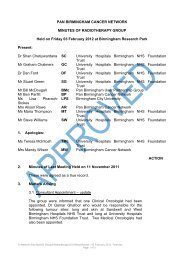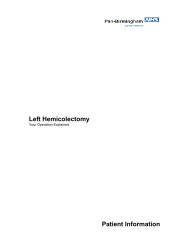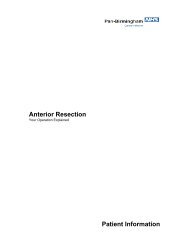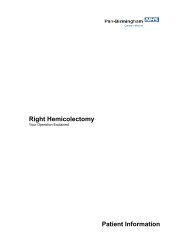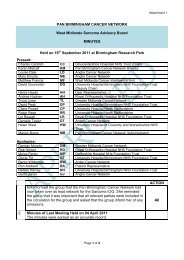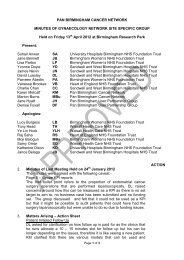Sigmoid Colectomy - NHS Pan Birmingham Cancer Network
Sigmoid Colectomy - NHS Pan Birmingham Cancer Network
Sigmoid Colectomy - NHS Pan Birmingham Cancer Network
You also want an ePaper? Increase the reach of your titles
YUMPU automatically turns print PDFs into web optimized ePapers that Google loves.
What are the alternatives?<br />
If the operation has been recommended by your surgeon as the best<br />
treatment, not having this surgery is very likely to lead to further<br />
worsening of your health. Depending upon what is wrong with you, you<br />
may develop a blockage of the bowel, leakage from the bowel into the<br />
abdomen or an abscess, all of which can be life threatening. If you have<br />
cancer the longer it remains the more likely it will spread and be<br />
incurable.<br />
For most of the conditions where this surgery is advised the only<br />
alternative is medical treatment with drugs. Where there is a cancer of<br />
the bowel, drug treatment alone will not cure the disease. Your surgeon<br />
will discuss any queries you may have.<br />
What are the consequences of treatment?<br />
After any major bowel operation the function of the bowel can change.<br />
You may experience:<br />
• Difficulty controlling wind.<br />
• Urgency or difficulty with bowel control.<br />
• Loose stools or diarrhoea.<br />
In most people, these improve with time but can take many months to<br />
settle down. You may sometimes need medication to help control your<br />
bowels. Please do not hesitate to contact your colorectal nurse for<br />
advice.<br />
Before the operation<br />
While you are waiting for your operation, it is important you try to prepare<br />
yourself physically. Try and eat a well-balanced diet including meat, fruit<br />
and vegetables. Take gentle exercise such as walking and get plenty of<br />
fresh air. If you smoke, we strongly advise you to stop.<br />
Pre-admission clinic<br />
To plan your operation and stay in hospital you may be asked to attend<br />
the hospital for a health check a week or two before your admission.<br />
This can take about two hours. If you are taking any medications please<br />
bring them with you.<br />
A doctor or nurse will listen to your chest, check your blood pressure and<br />
may send you for other tests, for example, a chest X-ray and an ECG<br />
(electrocardiograph – a tracing of your heart). This information will help<br />
the anaesthetist plan the best general anaesthetic for you. Blood will<br />
also be taken to check for any abnormalities so that these can be<br />
5



